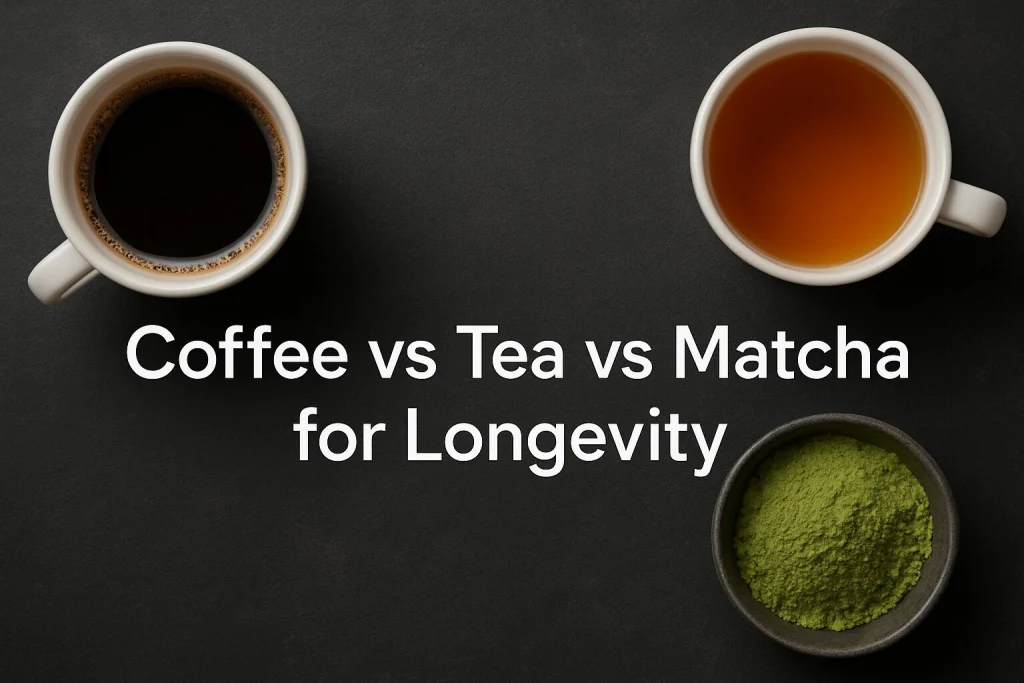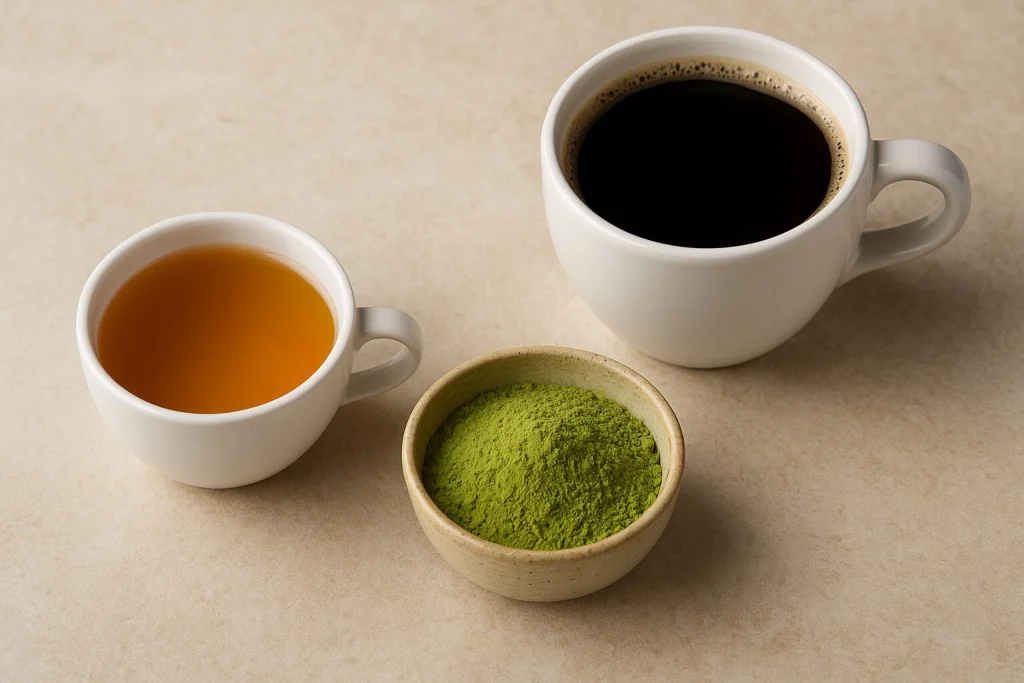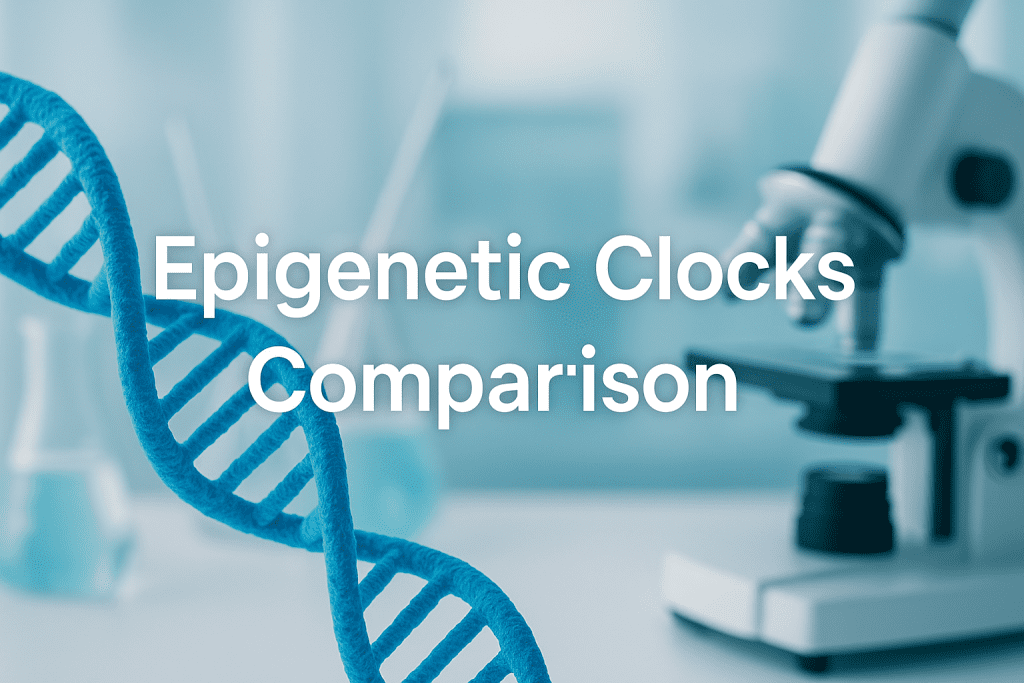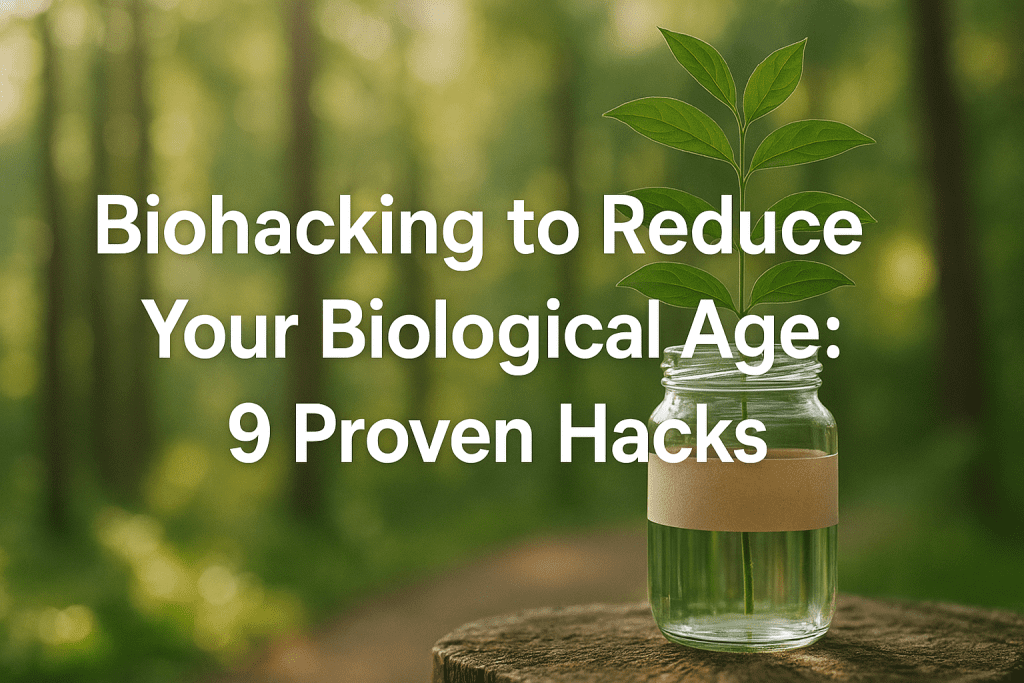
Most people think caffeine is just caffeine. But coffee, tea, and matcha don’t work the same way in your body. Each drink has a different set of compounds that affect your brain, heart, and even your biological age.
So when the question is coffee vs tea vs matcha for longevity, the answer isn’t one-size-fits-all. Let’s see what science says.
Coffee and Longevity: Benefits and Drawbacks
Does coffee make you live longer?
Yes, moderate coffee intake has been linked to lower mortality in large studies, but it comes with trade-offs.
✅ Benefits of coffee
☑️ Protects the liver and reduces risk of liver disease
☑️ Lowers risk of Alzheimer’s and Parkinson’s disease
☑️ Cuts the risk of type 2 diabetes
☑️ Boosts energy, alertness, and mood
⚠️ Risks of coffee
😵 Can cause jitters, anxiety, and energy crashes
🌙 Interferes with sleep if taken after noon
⬆️ Unfiltered coffee (like French press) may raise LDL cholesterol
Coffee works best as a morning tool. Filter it, drink it before noon, and you’ll get the protection without most of the downsides.
Tea for Heart and Lifespan Support
Which tea is best for lifespan support?
Green and black teas both show strong evidence for cardiovascular protection, making tea a heart-friendly longevity drink.
✅ Benefits of tea
❤️ Reduces risk of heart disease and stroke
📉 Helps lower blood pressure
🧘 Provides steady focus thanks to caffeine plus L-theanine
⚠️ Risks of tea
🩸 Can block iron absorption (important for people with anemia)
🦷 May stain teeth if consumed heavily
🔋 Provides a lighter stimulation compared to coffee
Tea is an excellent choice for afternoons. It supports the heart, provides calm focus, and won’t disrupt sleep as much as coffee.
Matcha: The Longevity Upgrade?
Is matcha better than coffee for longevity?
Yes, especially when quality is high. Matcha delivers antioxidants and smoother energy that may support long-term health better than coffee.
✅ Benefits of matcha
🌿 Contains EGCG, a potent antioxidant linked to slower aging
🧘 Provides calm, sustained focus without energy crashes
🧬 Whole-leaf nutrients not present in standard steeped tea
🌊 Supports gut microbiome and reduces inflammation
⚠️ Risks of matcha
⚡ Cheap powders may be contaminated with heavy metals
💸 More expensive than regular tea or coffee
One to two grams of high-quality matcha daily is enough to get measurable benefits.
Biological Age and Caffeine: What’s the Link?
Can caffeine intake affect biological age?
Yes. Lifestyle habits, including coffee and tea use, influence DNA methylation, inflammation, and cardiovascular health, all tied to biological age.
Coffee may improve liver and brain health markers, while tea and matcha may support immune and cardiovascular markers. Together, they can shift biological aging in measurable ways.
Want to know how fast you’re really aging?
Check the best at-home tests in our biological age comparison guide.

So Which Drink Wins for Longevity?
Which is better for long life, coffee, tea, or matcha?
Each wins in different ways.
- Coffee supports brain and liver
- Tea protects the heart and circulation
- Matcha combines both and adds higher antioxidant density
The most effective strategy isn’t choosing one forever. It’s stacking them across the day.
☕ Morning coffee for focus and liver protection
🍵 Midday matcha for calm energy and antioxidants
🍂 Afternoon tea for cardiovascular benefits without hurting sleep
Is Matcha Healthier Than Coffee?
Matcha is often considered healthier than coffee, but the truth depends on what you measure.
- Antioxidants: Matcha clearly wins here. One cup can have up to 10 times more antioxidants (especially EGCG) than brewed coffee. These compounds help fight oxidative stress and may slow biological aging.
- Energy curve: Coffee hits fast but fades quickly, sometimes with jitters or crashes. Matcha combines caffeine with L-theanine, giving a calmer, more sustained focus.
- Heart and gut health: Both drinks support cardiovascular health, but tea catechins in matcha are especially linked to reduced inflammation and better blood vessel function.
- Brain and liver protection: Coffee has the edge, with strong data on lower risk of Alzheimer’s, Parkinson’s, and liver disease.
The healthier option depends on your goals. If you want smooth energy and antioxidant density, matcha is the clear choice. If you need brain and liver protection, coffee still holds unique benefits. Many longevity researchers suggest using both strategically instead of choosing only one.
Can Your Morning Drink Really Slow Aging?
Can coffee, tea, or matcha directly extend lifespan?
Not directly. But research shows they influence biological pathways tied to aging, like inflammation, oxidative stress, and cardiovascular health.
- Coffee activates pathways that protect the liver and may lower risk of neurodegeneration.
- Tea reduces oxidative stress and improves vascular function, which slows biological wear and tear.
- Matcha delivers concentrated catechins (like EGCG) that improve DNA protection and reduce inflammation markers.
These changes don’t just affect how you feel today. They can show up in your biological age scores, the lab-based measures of how fast your body is aging compared to your birth age.
Frequently Asked Questions
Is matcha better than coffee for longevity?
Matcha offers more antioxidants and steadier focus. Coffee has stronger links to brain and liver protection. Both can support longevity when used wisely.
Does coffee make you live longer?
Yes. Large studies show moderate coffee drinkers have lower all-cause mortality. The key is moderation and avoiding late-day use.
Which tea is best for lifespan support?
Green tea has the strongest evidence, though black tea also supports cardiovascular health. Both are linked to lower mortality.
Can caffeine intake affect biological age?
Yes. Research shows caffeine impacts inflammation, stress response, and methylation, factors that determine biological age.
How much matcha, tea, or coffee is safe daily?
Coffee: 2–3 cups max
Tea: up to 3–4 cups daily
Matcha: 1–2 grams of powder daily
What’s the healthiest time of day to drink each?
Coffee in the morning, matcha mid-morning or midday, tea in the afternoon. Avoid caffeine 6–8 hours before sleep.
Does switching from coffee to tea lower disease risk?
For some people, yes. Tea is gentler on the heart and blood pressure, though both drinks reduce long-term mortality risk.
Which is better for sleep and aging, tea or coffee?
Tea, especially green tea, is less likely to disrupt sleep and may lower nighttime inflammation. Coffee too late in the day accelerates sleep disruption.
Sources
- Association of Coffee Drinking with Total and Cause-Specific Mortality (NEJM)
- Green Tea Consumption and Reduced All-Cause & Cardiovascular Mortality (JAMA)
- Coffee & Tea Together Linked with Lower Mortality (BMC Medicine)
- Green Tea Consumption and Lower Risk of Death (PMC)
- Tea, coffee, and matcha aren’t the same for longevity (Better Than Yesterday)



